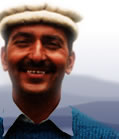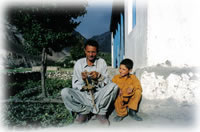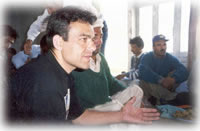 |
 |
||
 |
|||
|
RELATED THEMES family life identity migration social change OTHER LOCAL THEMES BACKGROUND |
social relationships
The two key aspects of social relationships discussed are the perceived decline of unity and cooperation and changing relations between generations. One elderly narrator comments: "…we had limited knowledge but we had unity. It was like we were the sons of one parent. In the pasture when someone would be in need of flour then others would lend him but they would not taunt each other for being poor. They would go to one another with their peel (wooden plate) to get qurut (dried cheese) for their soor (one's turn for grazing in rotational system) if they needed" (Pakistan 6). Another states, "In my view there was a lot of poverty in former times but there was unity. Now prosperity and comforts have reduced the unity and cooperation among the people" (Pakistan 13). Many are concerned that the road will contribute to greater individualism as more and more people become dependent on cash incomes from outside the village.
Some accounts suggest that in the past relationships between the young and old were more harmonious, with the young generation respecting their elders. Several of the older male narrators illustrate this by describing the difficult journeys in and out of Shimshal in the past: "…in those days travelling was more enjoyable and much better than today because they had respect for their seniors. They would help the seniors crossing the rivers and streams. They would carry them on their back and would take them across the rivers. Similarly when they would reach at their camping places the young would collect wood and make the arrangements for fire for the seniors. In turn the seniors would spare some bread and would offer it to the young recognising their exertion…" (Pakistan 5). It is not just between men that changes have occurred. Several elder female narrators claim that daughters-in-law no longer give their mothers-in-law appropriate respect. There are also several comments by men and women stating that the younger women in Pamir are less respectful and helpful to the older women there. Qandoon, who married into Shimshal from Passu, recalled how "I liked the submissive and respectful attitude of the youth with older people… Whenever there were social meetings each one would participate in it and would patiently listen to the elders. The young honoured the decisions of the elders" (Pakistan 4). Whilst the notion of a generation gap is common to most societies, it is clear that in Shimshal the migration of the younger generation, coupled with increased education and waged employment, has contributed to widening this gap. Inayat (Pakistan 2) suggests that the changing relationships and values between the young and old are less straightforward than one might expect. He describes a period 10 or so years ago when it was the older generation who were rejecting Shimshal's traditions and culture because they felt that those who were migrating, the younger generation, would no longer listen to them. Consequently much of the enthusiasm for maintaining culture and traditions came from the younger generation who became increasingly aware of the speed of change in their society. There are several short references to foster mothers and fathers. A person's foster mother (literal translation "milk-mother") is a woman (not their own mother) who provided them with breast milk. This could be for several reasons: either they were considered to have produced strong children and so their milk was supposed to have a similar effect on another's child; or if a mother is busy with a task which takes her away from her baby, another woman will step in to feed this child. In both cases it was not a continuous arrangement, just occasional, and this arrangement was prevalent throughout Hunza, Nagar and Gojal. Such "fostering" generated additional social relationships between families; in particular, families who "fostered" the Mir's children were generally granted a position in a village such as arbob, yarpa etc quotes about social relationships"The reason for the unity in former times was the honesty and sympathy of the people… if somebody among them was poor or physically week, they would never let him feel his deficiency. If someone was not capable to bear the expenses of collective works such as [providing] the food during fertiliser delivery and ploughing the fields, then those who were well off would bear these expenses. In this way the works of the poor were done collectively… In this way they would help each other. They would never abuse a person for being poor. This was the spirit of sympathy and love for each other." "If you are alone somewhere then you will be worried there, because no one is your relative there, and all of them are strangers to you. But in Shimshal there is no fear in our mind about some person, here everyone is like our own brother and father. We are all blood relatives. So here it is an open and secure life. That is why I like this life, I mean village life, very much." "Today's young generation now no longer value qadeema aql (ancient wisdom); they tell us that this is "crazy old mind". They call us like that… Now if I say anything you don't obey it, you argue twice as much. I am talking of disrespect. The era is like this. Then (in the past) we always listened, respected and did what the elders said. Now everyone thinks he knows better. Now those who hold pen, book, and pencil they have the say." "…yarapgi and trumpahgig were the jobs of the people living in down villages… the people of Shimshal never did these jobs. But sometimes these titles depended upon the source of relation with the Mir. My uncle Momin Shah was the first yarpa of Shimshal, because his mother's sister had [breast] fed Mir Nazeem Khan's son. So on the basis of this relation my uncle got the yarapgi for the first time." "Our village Shimshal is very far from other villages… Another important reason for that [love and affection] was due to the very close kinship with each other that brought us very close to each other. Due to close kinship and also due to the reason that our joys of life and sorrows of death were all in the one place further strengthened this relationship… the sympathy declines for the reason that in modern times more and uneven earning makes people independent, everyone earns for themselves." "…we used to respect our elders a lot. We used to obey whatever they guided us. But now even if I tell something to my granddaughter, she ignores it. In those days we used to live four or five families together, and we were very happily living together. Now if a person is married he wants to divide and live separately, because they cannot live together, they cannot accept one another… There are some things that you don't want to accept. It is necessary for the sake of others if you want to live with them. Sometimes you have to sacrifice for others then you will be able to be accepted by others. But now a woman does not have such qualities and that's why they want to have an independent life and her own separate house." "I would say that there was much more unity among the people (in olden days). People would sit together and would share their happiness with each other. In a family they would live with great unity and would share the household activities. They would not discriminate against each other on the basis of performance [rather they would collectively carry out the work] and would also care for each other's food requirements. They were happy to participate in community activities. Today I see that when our children (youth) get married they leave their parents. They separate from their parents just to feed their own children." "The more people become prosperous the more they become arrogant, senior members in the family are loosing their traditional importance and respect. Whenever there comes a guest in a house the junior of the family according to their wish prepares food for the guest with consultation with the senior. This embarrasses the mother in-law and the Jethani (wife of husband's elder brother) for the reason that their views are not valued." |
|
 Reading through the testimonies, one senses much affection and respect between interviewers and narrators, which is extended to the other members of the community referred to in the interviews.
Reading through the testimonies, one senses much affection and respect between interviewers and narrators, which is extended to the other members of the community referred to in the interviews.  Despite this perceived decline in unity, those narrators who have spent time living outside of Shimshal in the cities, down country - even in the nearby town of Gilgit - compare Shimshal favourably to them in terms of its support networks and sense of community. For example, one narrator explains:
Despite this perceived decline in unity, those narrators who have spent time living outside of Shimshal in the cities, down country - even in the nearby town of Gilgit - compare Shimshal favourably to them in terms of its support networks and sense of community. For example, one narrator explains: